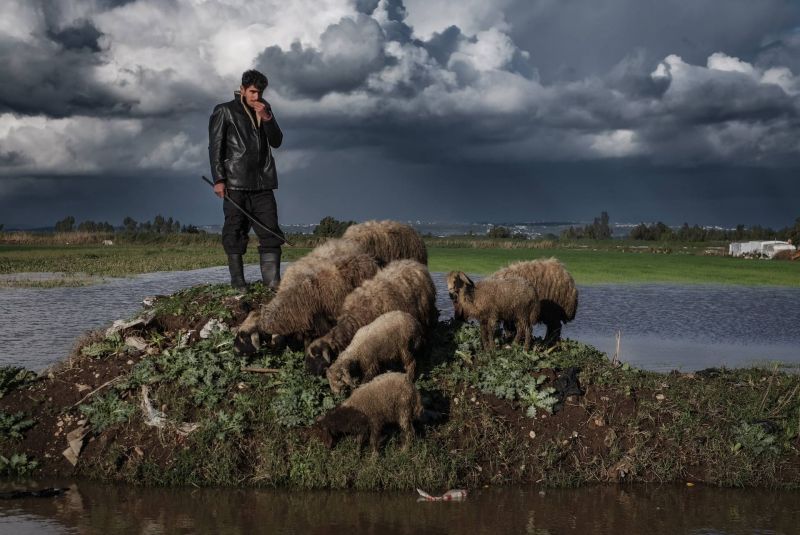
A shepherd guides his flock through floodwater in an informal Syrian refugee camp on the outskirts of the village of Summaqieh, on the border with Syria. Jan. 15, 2024. (Credit: João Sousa/L’Orient Today)
SUMMAQIEH, Akkar governorate — Two days after a massive rainstorm unleashed waist-deep floods, Syrian women gather by the side of the road to wash buckets of jeans and carpets that they've managed to fish out of the mud.
There's no longer any clean water to wash them in — instead, the women simply scrub their laundry outside in the dirty standing floodwater, steps from debris and mud-filled tents. Some of them have no shoes.
The pasture outside Summaqieh, a tiny farming village of just over 1,000 residents on the border with Syria in Lebanon's far northern reaches, was, before this week, a flat expanse of green. There were small-scale tobacco and vegetable farmers, beekeepers and shepherds raising their flocks. On the edge of town was also an informal settlement of several hundred tents, inhabited by Syrian refugee families from Hassakeh, Hama and Homs.
Now the area is a sprawling brown pond speckled with overturned dumpsters, motorcycles and waterlogged tents. No longer able to live in their tents, around 1,750 Syrian refugees are now sleeping in Summaqieh's mosque and school, according to Ghassan Hanna, the Akkar representative for the Lebanese Red Cross, which helped set up and supply the temporary shelters. Another 91 Syrian people are sleeping in a diwan social hall owned by former mayor Bilal Chama, who says he opened his doors to the flood evacuees over the weekend.
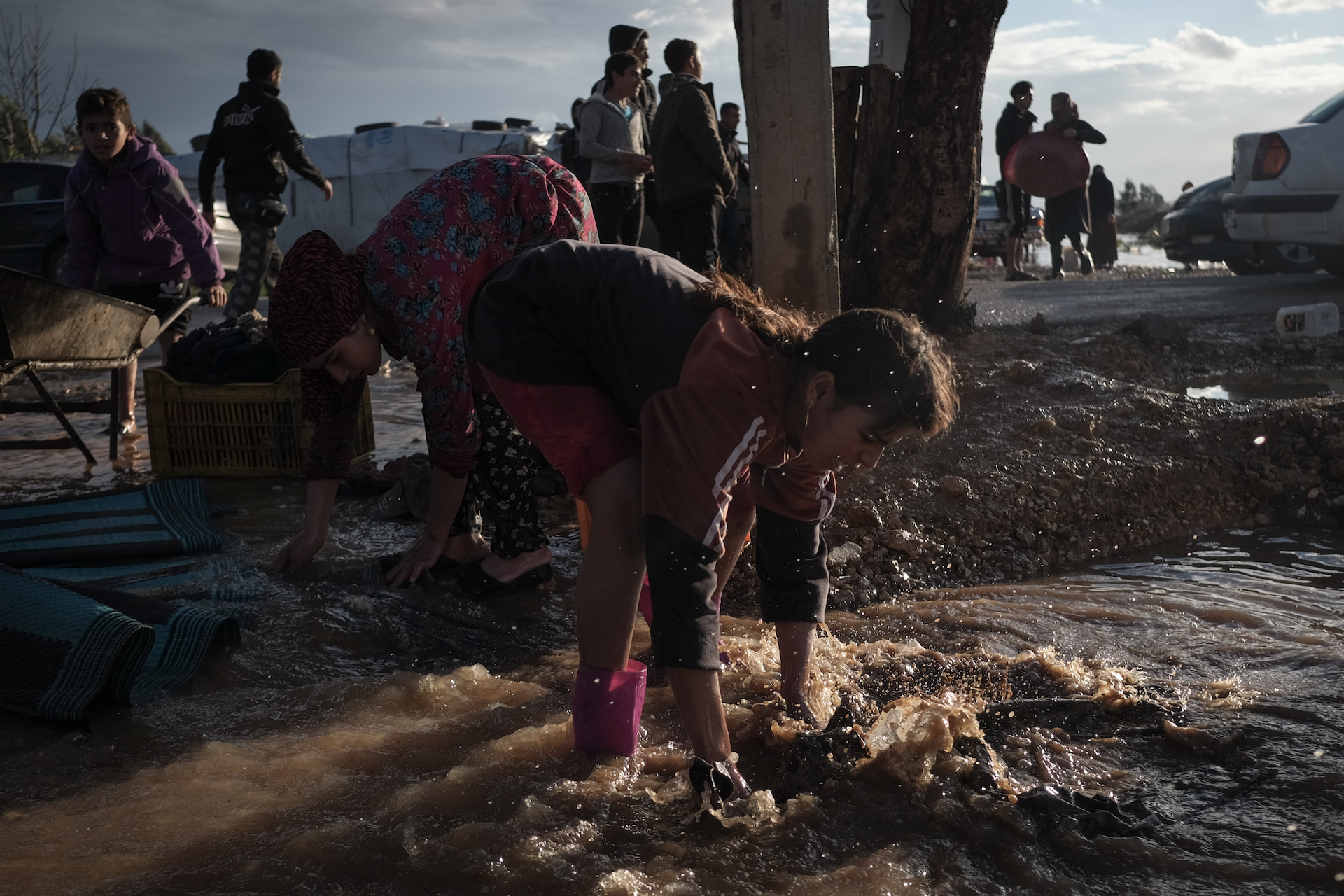 Women and children wash clothing in floodwater in an informal Syrian refugee camp on the outskirts of the village of Summaqieh, on the border with Syria. Jan. 15, 2024. (Credit: João Sousa/L’Orient Today)
Women and children wash clothing in floodwater in an informal Syrian refugee camp on the outskirts of the village of Summaqieh, on the border with Syria. Jan. 15, 2024. (Credit: João Sousa/L’Orient Today)
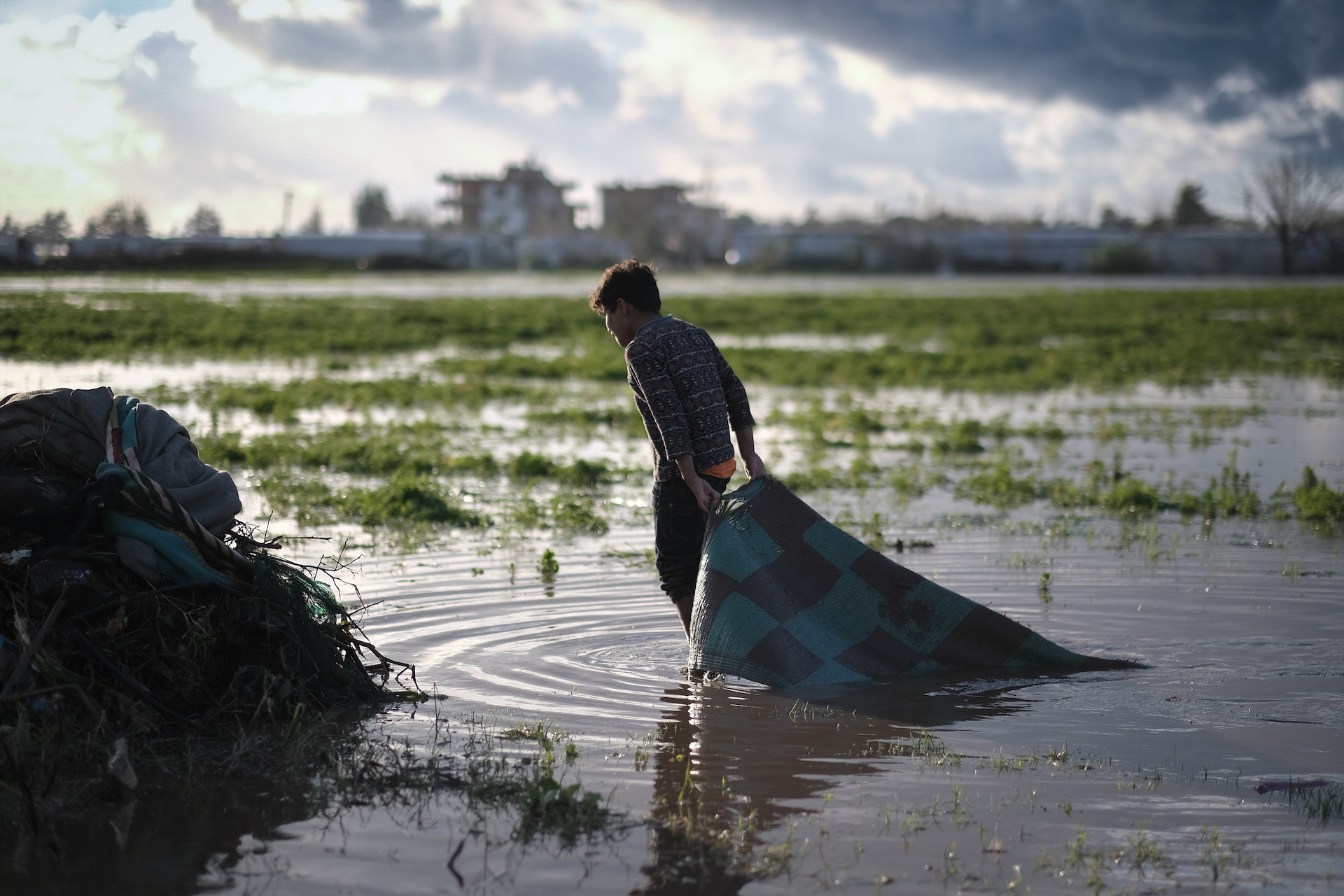 A child carries a muddied blanket through floodwater in an informal Syrian refugee camp on the outskirts of the village of Summaqieh, on the border with Syria. Jan. 15, 2024. (Credit: João Sousa/L’Orient Today)
A child carries a muddied blanket through floodwater in an informal Syrian refugee camp on the outskirts of the village of Summaqieh, on the border with Syria. Jan. 15, 2024. (Credit: João Sousa/L’Orient Today)
Meanwhile, Lebanese villagers whose ground-floor apartments flooded have also been forced to leave their homes, staying with family members lucky enough to live above ground level. They say they've been left alone to mop up the mud from their homes.
Though floods in this coastal part of Akkar governorate are common each winter, residents say this past weekend was the worst they've seen in several years.
Already some of the water has subsided, but in its wake are signs of the disaster that tore through on Saturday.
The storm that day brought torrents of rain that began seeping into tents, homes and businesses within hours, residents tell L'Orient Today. Much of the town was only accessible via tractor.
Ishaq Fadel Khabour, who lives in one of the informal camps nearby, says his tent quickly filled with water after the storm began. But his daughter, 20-year-old Raya, has cerebral palsy and couldn't escape the rising floodwater on her own.
“So I carried her on my back.”
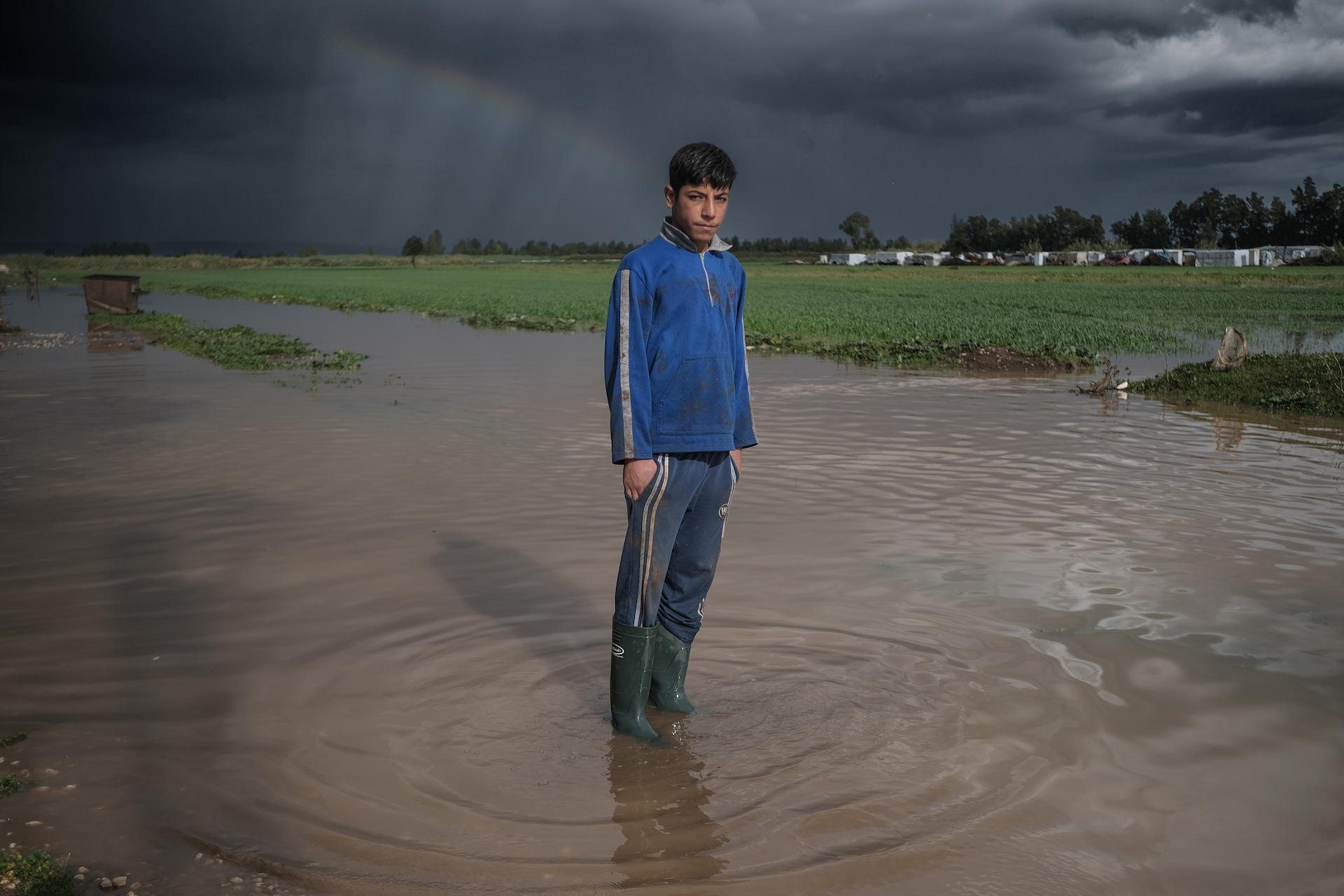 Sixteen-year-old Jihad Zeidan wades through the floodwater in the informal camp where he lives with his parents and siblings on the outskirts of Summaqieh, a border village in northern Akkar governorate. Jan. 15, 2024. (Credit: João Sousa/L’Orient Today)
Sixteen-year-old Jihad Zeidan wades through the floodwater in the informal camp where he lives with his parents and siblings on the outskirts of Summaqieh, a border village in northern Akkar governorate. Jan. 15, 2024. (Credit: João Sousa/L’Orient Today)
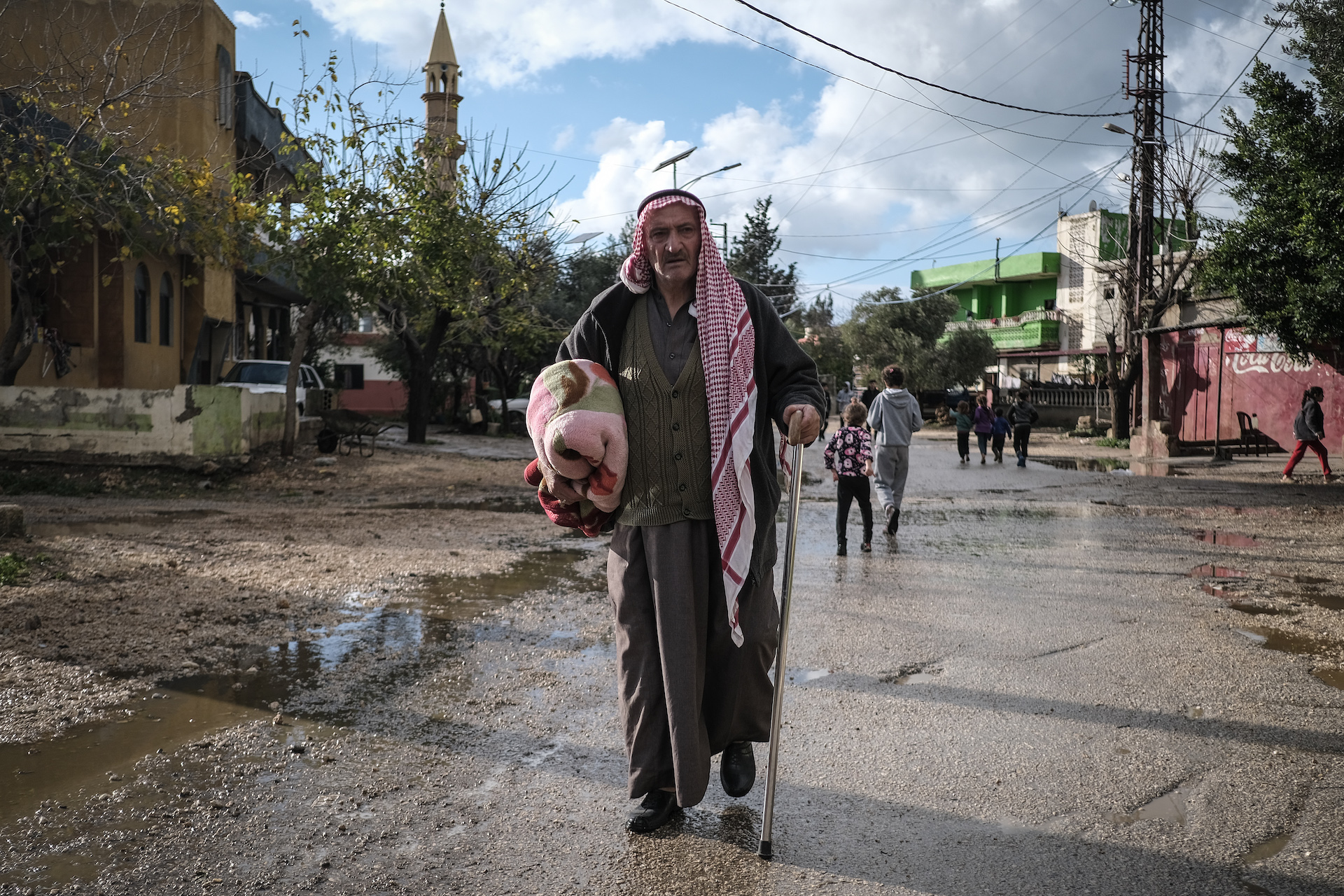 Seventy-year-old Ahmad al-Bahadi, originally from Hassakeh in northwestern Syria, walks back to his waterlogged tent after sheltering for several days in a local mosque. Jan. 15, 2024. (Credit: João Sousa/L’Orient Today)
Seventy-year-old Ahmad al-Bahadi, originally from Hassakeh in northwestern Syria, walks back to his waterlogged tent after sheltering for several days in a local mosque. Jan. 15, 2024. (Credit: João Sousa/L’Orient Today)
Ishaq and Raya have been sleeping in the village mosque for three days alongside several hundred other people, their family's allotted section of the prayer hall simply mapped out by a carpet large enough for them to lie down on.
Just steps away from the mosque, one local farmer, elderly Abdulrazzaq Awad Shaqra, stacks his dead sheep in a pile outside his clapboard barn, their wool caked in mud. Some 40 or so of his 250-head flock of sheep drowned, with another 40 expected to die from “incurable” diarrhea wrought by the cold, wet weather.
He dumps stacks of waterlogged tobacco leaves and livestock feed into his muddy courtyard alongside a ruined electric tiller machine — they're useless now, destined for a nearby ditch the residents use as a garbage pit. $2,000 down the drain, he estimates.
Belongings washed away
“Rice, lentils, sugar, tea, the washing machine. The generator. The mattresses, too, and clothes.” Sixteen-year-old Jihad Zeidan wades through the murky water and lists the belongings his family lost as their tent on the edge of town drowned in the flood.
Do they have money to rebuild their makeshift lives? “No, really we have nothing,” says his father Maher, who works as a farm laborer.
“This happens every year, but usually not so bad. This year was the worst.”
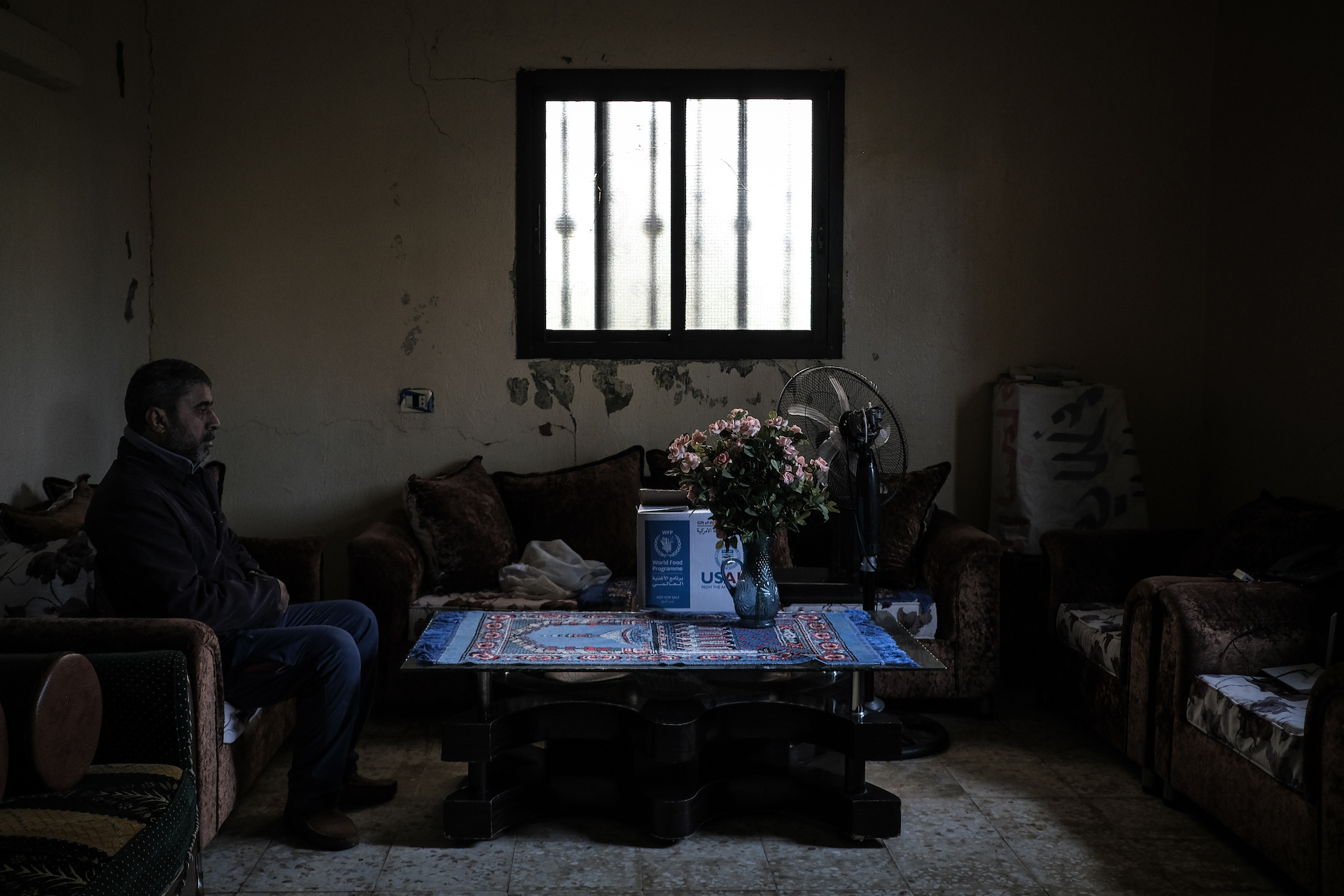 A home in Summaqieh where residents said the weekend’s storm caused knee-high floodwaters in the living room. Jan. 15, 2024. (Credit: João Sousa/L’Orient Today)
A home in Summaqieh where residents said the weekend’s storm caused knee-high floodwaters in the living room. Jan. 15, 2024. (Credit: João Sousa/L’Orient Today)
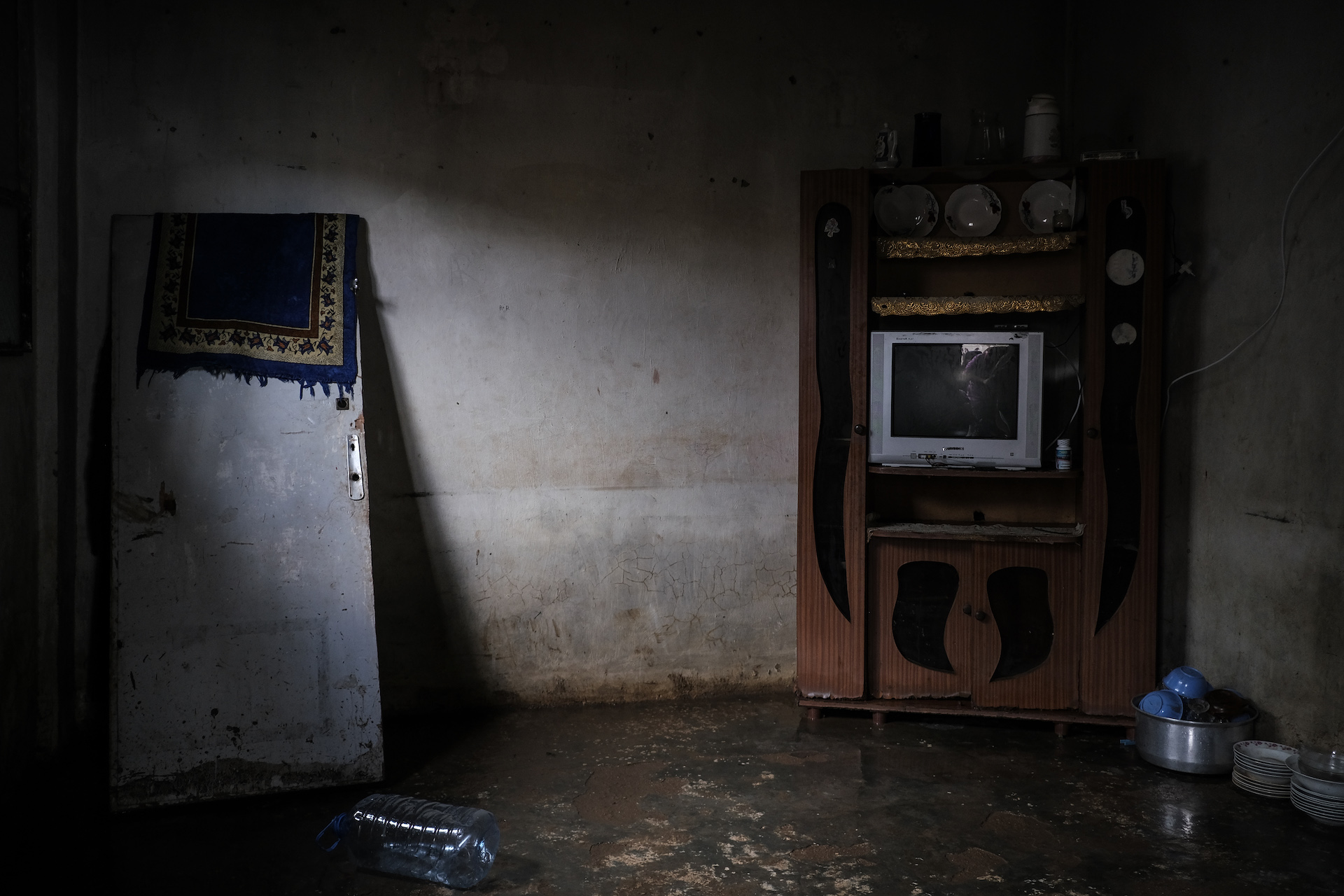 A home in Summaqieh where residents said the weekend’s storm caused knee-high floodwaters in the living room. Jan. 15, 2024. (Credit: João Sousa/L’Orient Today)
A home in Summaqieh where residents said the weekend’s storm caused knee-high floodwaters in the living room. Jan. 15, 2024. (Credit: João Sousa/L’Orient Today)
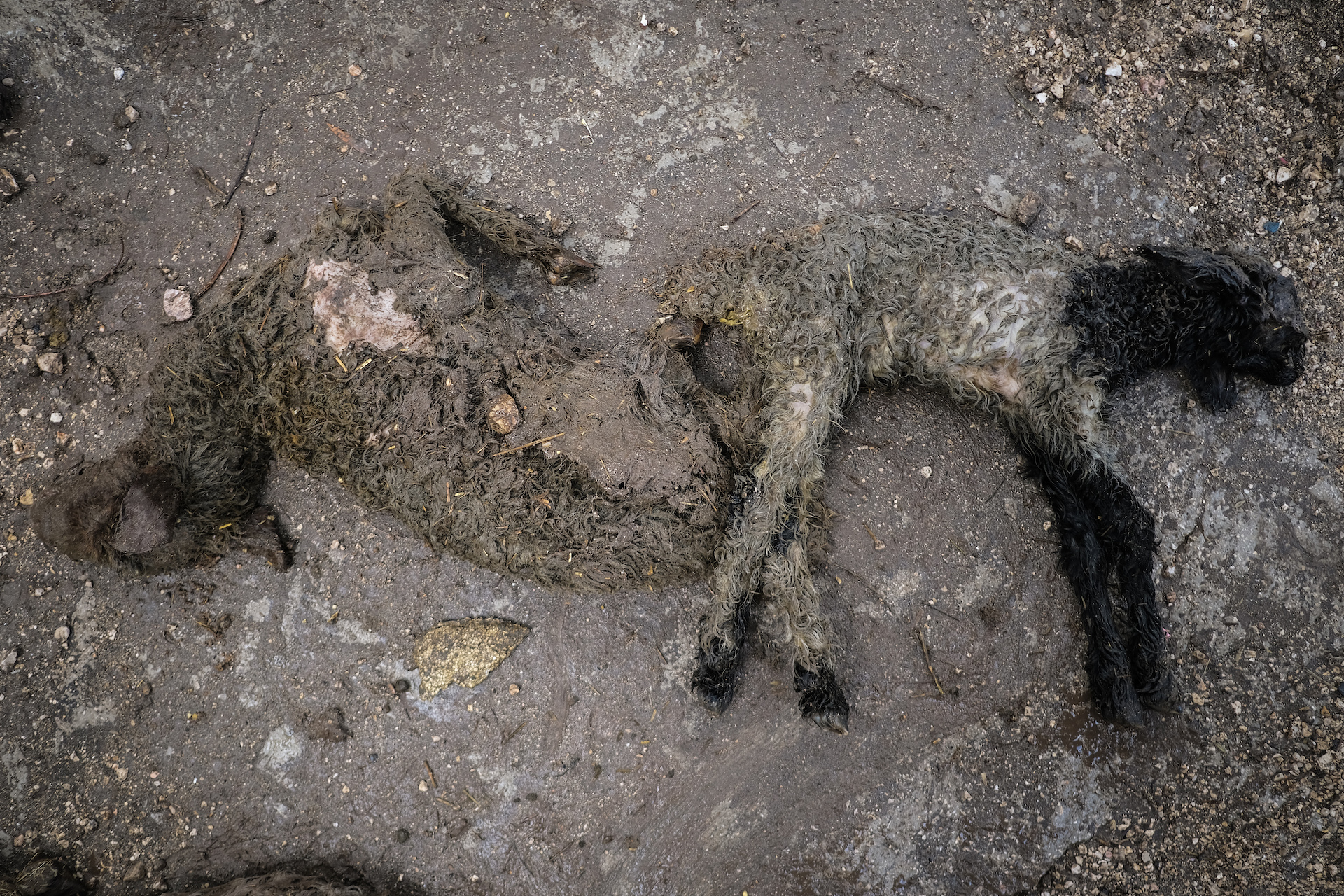 Two of local farmer Abdulrazzaq Awad Shaqra’s sheep that were killed in the weekend’s flood. Of his 250-head flock, about 40 were killed. Jan. 15, 2024. (Credit: João Sousa/L’Orient Today)
Two of local farmer Abdulrazzaq Awad Shaqra’s sheep that were killed in the weekend’s flood. Of his 250-head flock, about 40 were killed. Jan. 15, 2024. (Credit: João Sousa/L’Orient Today)
It's not clear when or how those who lost their tents might receive new ones.
Such assistance would be the responsibility of UNHCR, according to Hanna from the Red Cross. A UNHCR representative told L'Orient Today by phone that they were providing “core relief items” and “shelter kits,” including plastic sheets to help repair tents, to flood victims in northern Lebanon. It was not immediately clear if those recipients were in the Summaqieh camps or other areas.
By Monday afternoon, an unmarked truck and car arrive at one of the camps and about two dozen people gather around to help unload water gallons and packages of flatbread. They say it's a fresh delivery of aid from the Lebanese Red Cross.
Among those helping unload is Tamer Zeidan, a wiry man from Hama, Syria with a thick black mustache. He is the coordinator for Camp #7 of the 11 informal camps in Summaqieh, which means he works with the Red Cross, Lebanese Army and other parties to help deliver aid to the roughly 125 refugees he estimates are under his care.
Like other camp residents, Zeidan says this past weekend's flood was “much stronger” than the typical winter rains. Zeidan points to his chest — that's how high the water reached in some parts of his camp.
“Nothing remains” in his own tent, which housed Zeidan, his wife and five children.
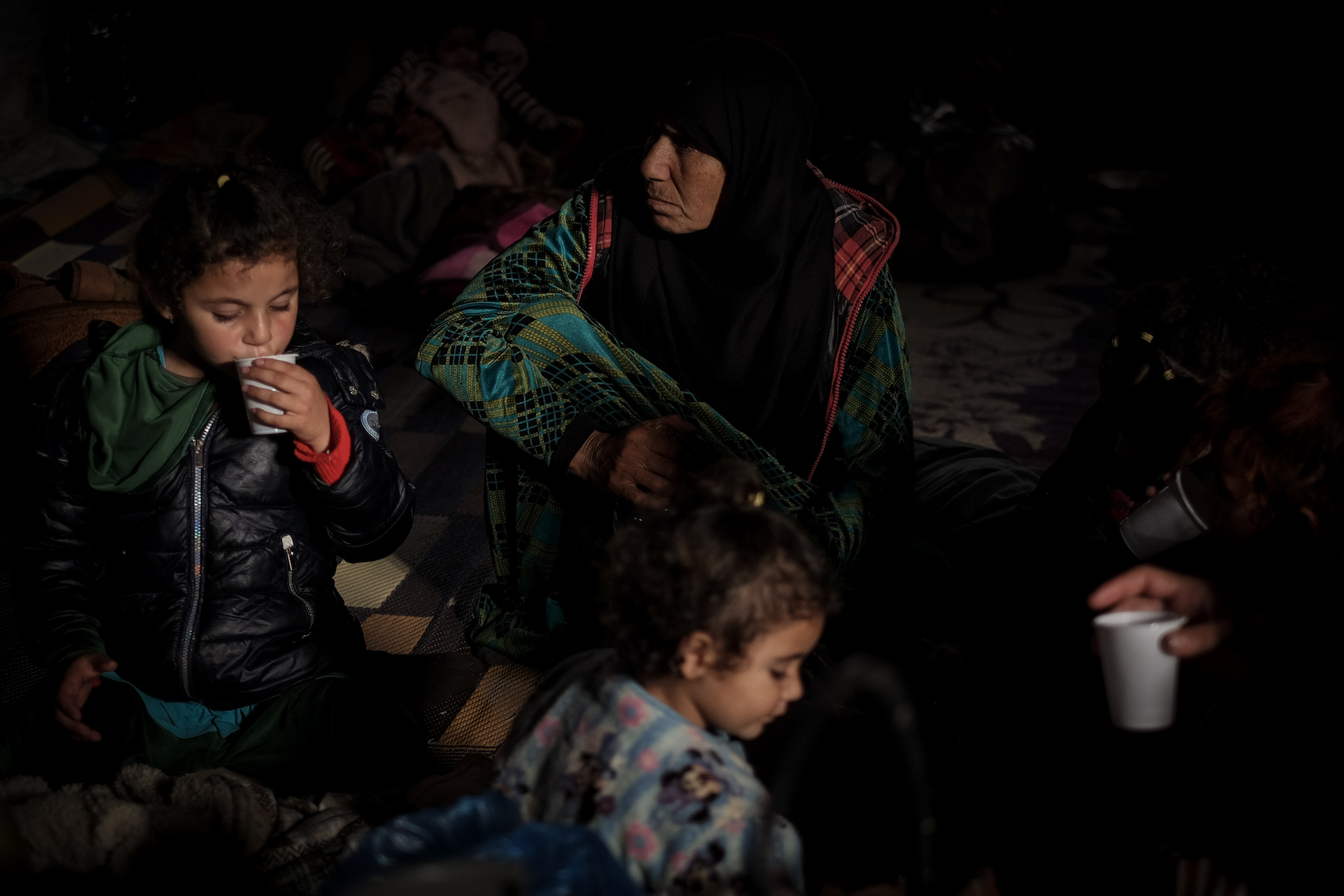 A family rests on the floor of the local mosque where hundreds of people have been sheltering since the weekend’s storm destroyed their tents in the nearby informal refugee camp. Jan. 15, 2024. (Credit: João Sousa/L’Orient Today)
A family rests on the floor of the local mosque where hundreds of people have been sheltering since the weekend’s storm destroyed their tents in the nearby informal refugee camp. Jan. 15, 2024. (Credit: João Sousa/L’Orient Today)
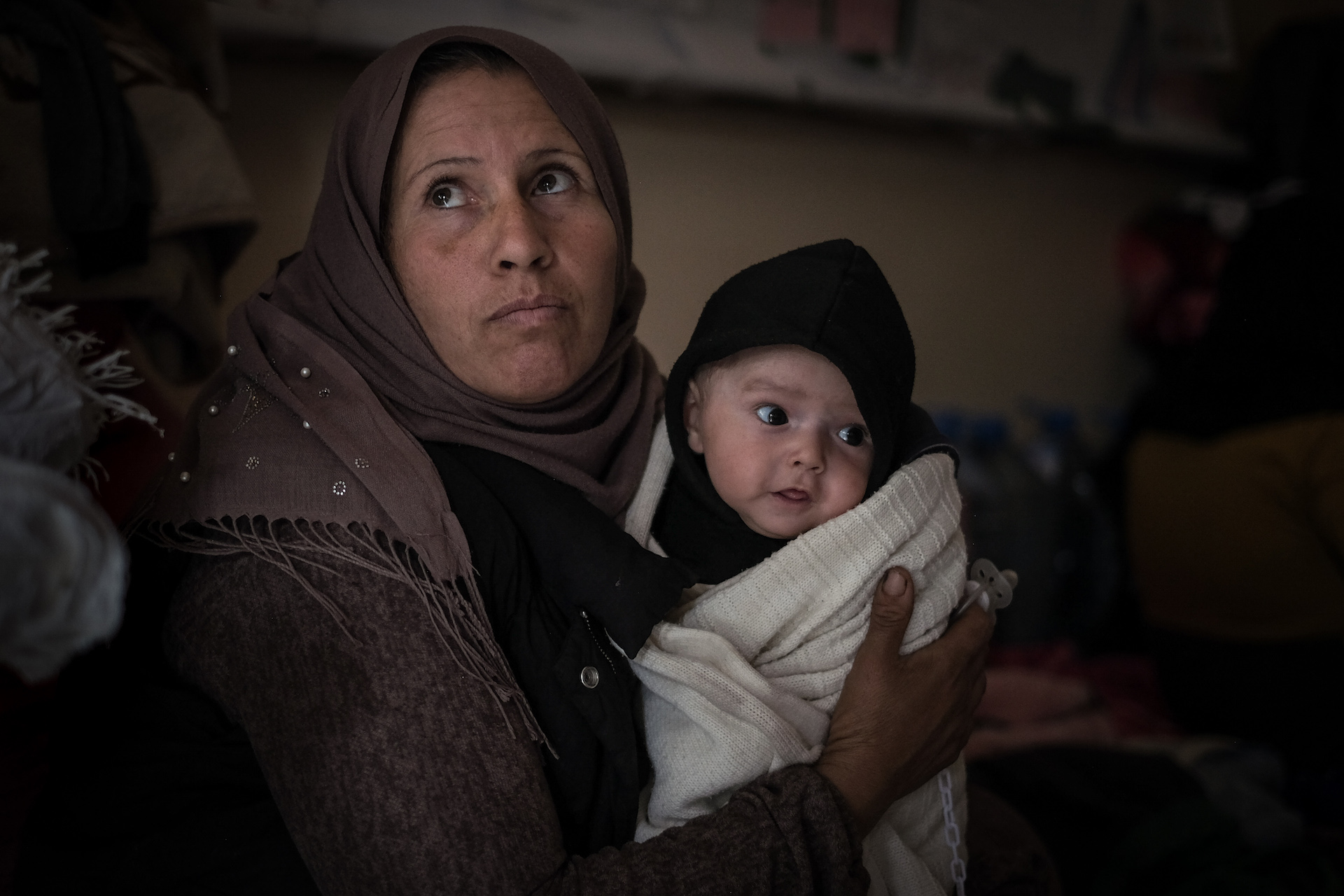 Alia Muhammad Mshawwah sits with one of her three-month-old twins in a village social hall after losing her tent in the nearby refugee camp to a massive flood. Jan. 15, 2024. (Credit: João Sousa/L’Orient Today)
Alia Muhammad Mshawwah sits with one of her three-month-old twins in a village social hall after losing her tent in the nearby refugee camp to a massive flood. Jan. 15, 2024. (Credit: João Sousa/L’Orient Today)
Children abound among those displaced by the floodwaters, weaving between the adults in the mosque, school and diwan. Some sit by wood sobia heaters while others simply lay on the floor.
The youngest of them are likely Alia Muhammad Mshawwah's three-month-old twins, whom she cradles tenderly on the floor of the village diwan. Though she is originally from Hassakeh in Syria's far northeast, her babies were born refugees here, in the informal encampment outside Summaqieh.
The growing young family has no tent to return to, as it's filled with floodwater.
Alia's husband, who goes by Abu Aya, returns to the crowded diwan from checking on the camp, his coat and hair dripping from the remaining floodwater.
He points to his wet clothes. “This tells the whole story.”
Overcrowding
And yet, some Syrian families are already returning to their tents, fed up with multiple nights spent sleeping crowded among hundreds of other women, men and children with no privacy. One group of women in the mosque say they're worried about the flu spreading quickly. A Red Cross mobile clinic that afternoon finds some 135 people — Syrians and Lebanese — sick with various illnesses in the village, including flu, Hanna says.
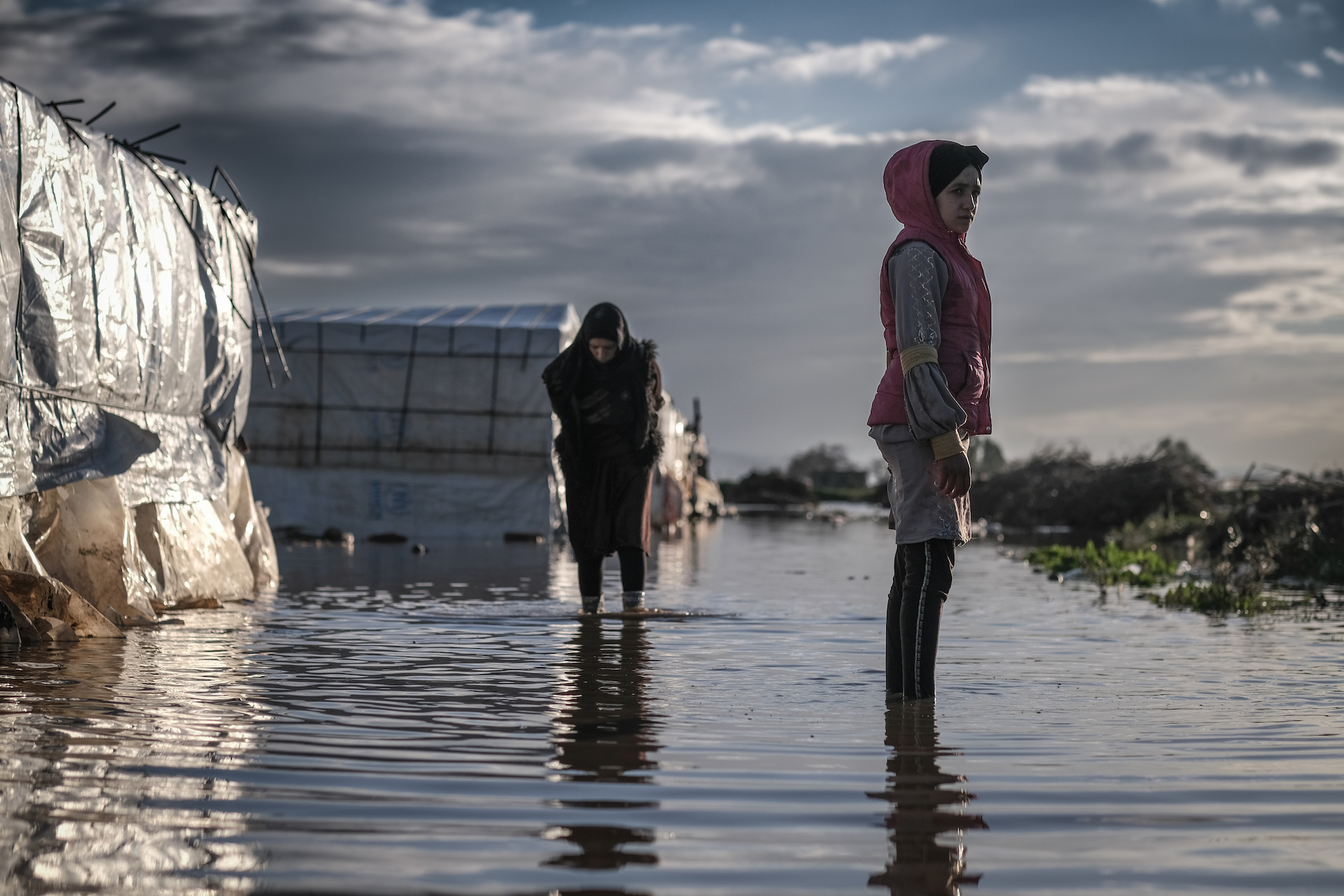 People wade through floodwater in an informal Syrian refugee camp on the outskirts of the village of Summaqieh, on the border with Syria. Jan. 15, 2024. (Credit: João Sousa/L’Orient Today)
People wade through floodwater in an informal Syrian refugee camp on the outskirts of the village of Summaqieh, on the border with Syria. Jan. 15, 2024. (Credit: João Sousa/L’Orient Today)
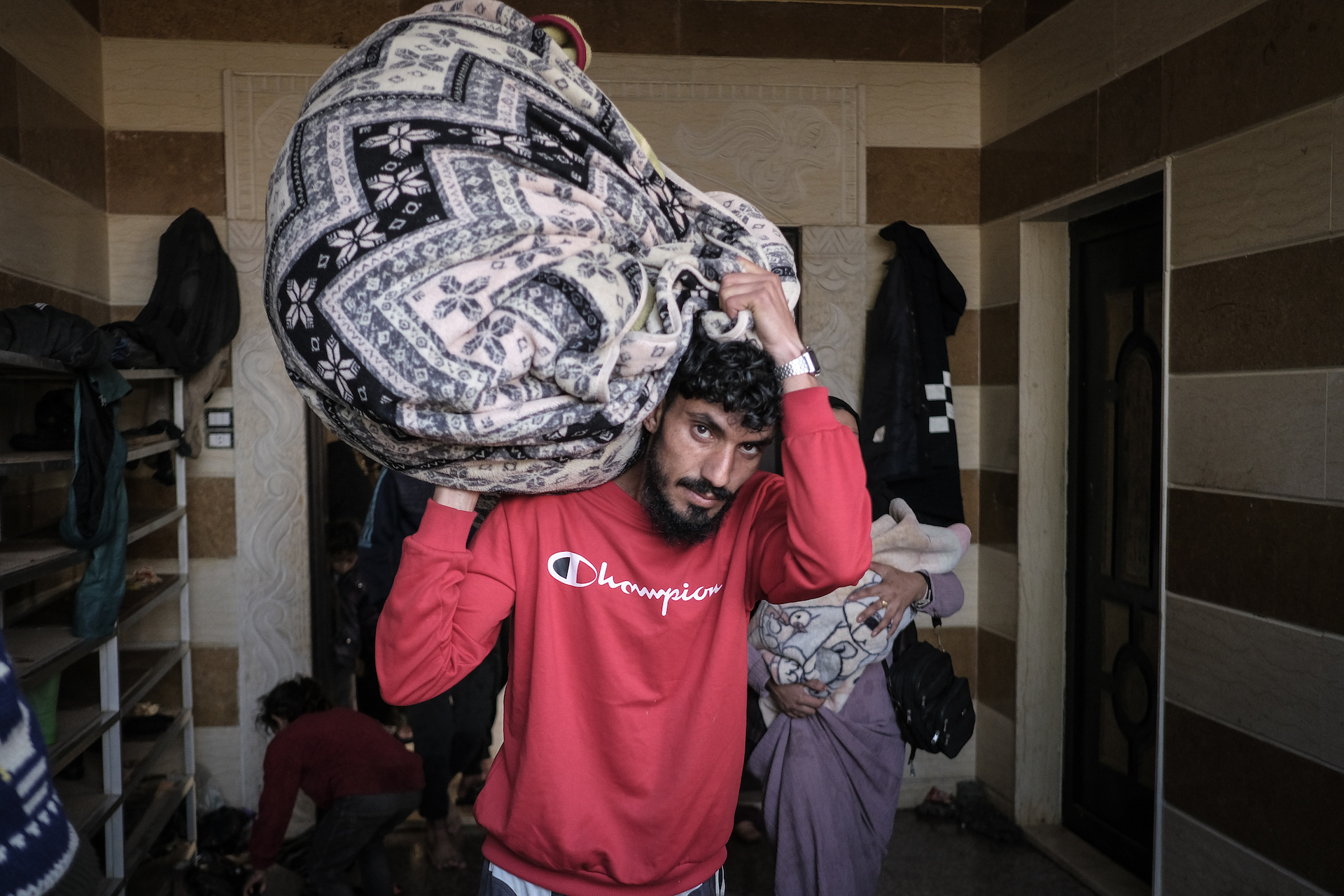 A man displaced by flooding carries his belongings out of the mosque in Summaqieh where he has been sheltering since the weekend storm. Jan. 15, 2024. (Credit: João Sousa/L’Orient Today)
A man displaced by flooding carries his belongings out of the mosque in Summaqieh where he has been sheltering since the weekend storm. Jan. 15, 2024. (Credit: João Sousa/L’Orient Today)
And so they walked back down the damp road, piles of blankets and plastic bags crammed with clothing in tow.
Sahar al-Hasieh, who has returned to the camp to clean up what she can, takes a break from washing clothes in the floodwater and points out the tent she shares with her husband and five daughters. It's a one-room wooden frame covered with a tarp, packed among dozens of other tents. Inside is a mangled mess of wooden boards, mud and debris.
Next door, a makeshift dukkaneh tent is out of business, with owner Sami al-Ahmad stacking what he can recover of his Mirinda orange sodas and bags of sugar and salt. Like local farmer Abdulrazzaq, Ahmad estimates his small business lost $2,000 in the flood.
There is little else they can do to alleviate the swamp now engulfing their camp, with yet another winter storm forecast for next week.
In the meantime, barefoot women and children simply pace back and forth under gray clouds, scooping away water by the bucketful.
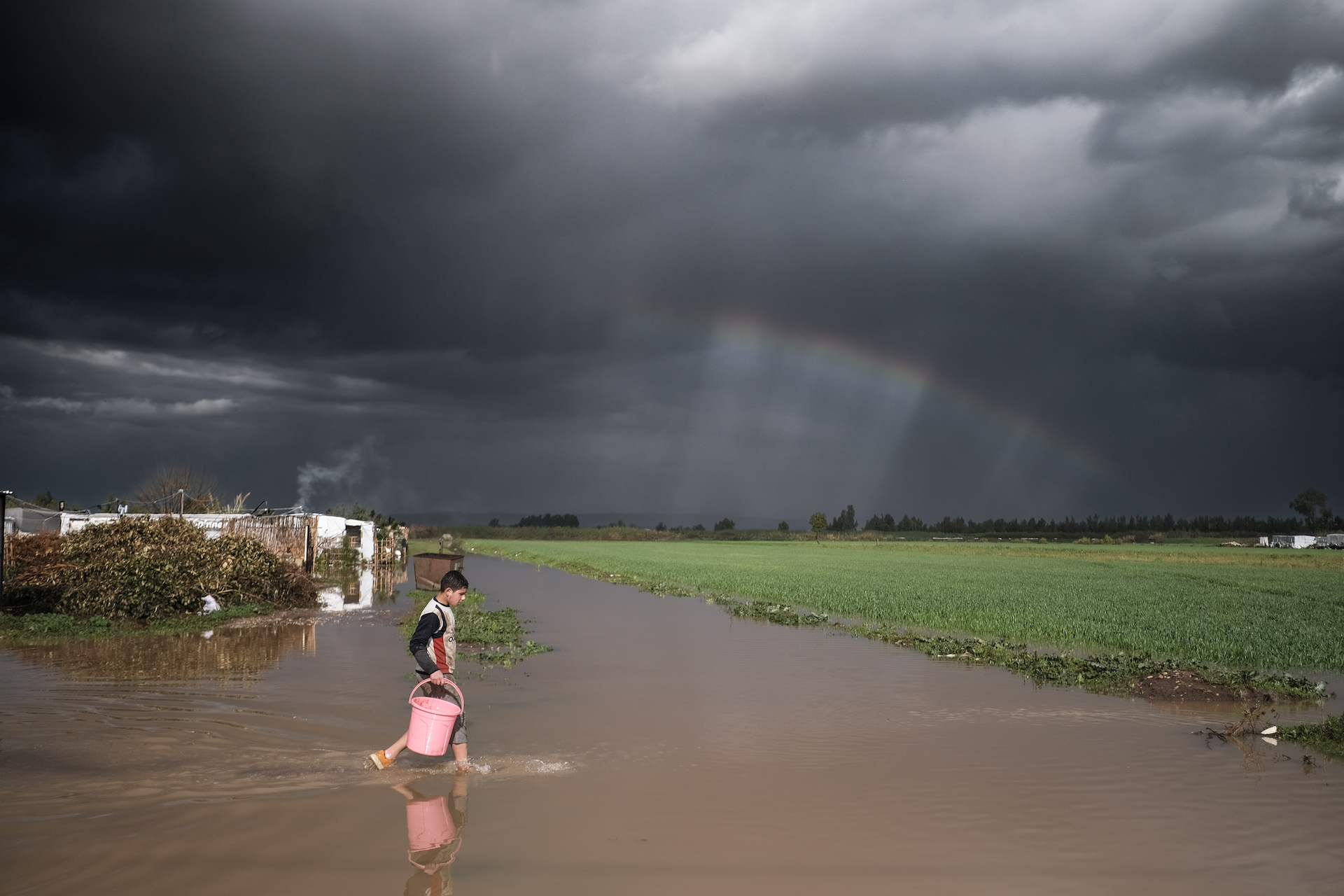 A boy wades through the floodwater in an informal camp on the outskirts of Summaqieh, a border village in northern Akkar governorate. Jan. 15, 2024. (Credit: João Sousa/L’Orient Today)
A boy wades through the floodwater in an informal camp on the outskirts of Summaqieh, a border village in northern Akkar governorate. Jan. 15, 2024. (Credit: João Sousa/L’Orient Today)
